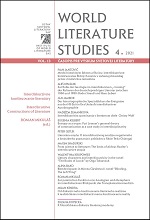Literary characters and interdiscursivity in the novel “The Books of Jacob” by Olga Tokarczuk
Literary characters and interdiscursivity in the novel “The Books of Jacob” by Olga Tokarczuk
Author(s): Walentyna KrupowiesSubject(s): Studies of Literature, Polish Literature, Theory of Literature
Published by: Ústav svetovej literatúry, Slovenská akadémia vied
Keywords: Literary characters; Social discourses; Literary discourse; Olga Tokarczuk;
Summary/Abstract: This article includes an analysis of selected characters in The Books of Jacob (Księgi Jakubowe [2014] 2019) by Olga Tokarczuk from the context of discourse. The analysis is based on the concept of literary characters as the “common ground” for a discourse in literature, existing within the Polish theory of literature, as well as a discourse on extra-literary reality. In Tokarczuk’ s novel, there is a clash of two major discourses: rationalistic and metaphysical-messianic. The former appears at times as scientific-medical, represented by one of the background characters, Rubin Asher. The character is the quickest to emancipate himself, in his community, impersonating the modernity and rationality of the Enlightenment. The character who plays the role of the “common ground” for metaphysical-messianic discourse is Jacob Frank. Molivda-Kossakovski is situated at the intersection of several discourses. His multi-discursivity combines rationalistic, metaphysical, ethnic and multi-cultural discourses, of which the latter plays a critical role for the former ethnic one. The interdiscursivity of the work puts forward the knowledge of the origins of modernity in remote periphery, of the beginnings of modern ways of world categorization and generates critical discourse.
Journal: World Literature Studies
- Issue Year: 13/2021
- Issue No: 4
- Page Range: 94-105
- Page Count: 12
- Language: English

